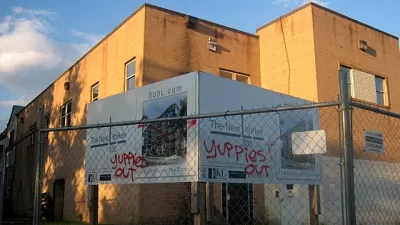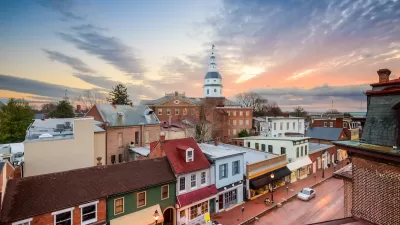Trying to thread the needle between those who celebrate the demise of the exurb and those who bemoan smart growth policies, Edward Glaeser argues that we can, and should, have it all when it comes to housing choice in America.
Rather than picking sides in the sprawl versus density debate, Glaeser argues for the importance of all of the above:
"Economic theory typically embraces choice, whether in supermarkets or in cities. It is a great thing that Americans can opt to live in dense cities or sprawling suburbs. As long as people pay the social costs of their actions, and are not subsidized by policies that artificially favor one living style over another, then it is splendid that we have plenty of options, some with sunshine and inexpensive mass-produced housing and others with high wages and costly apartments."
The crucial caveat in the above statement should not go unnoticed, as it serves as the front line in the debate between the supporters of sprawl and density. Rather than getting caught up in current skirmishes, however, Glaeser frames the debate in larger historical terms:
"The tides of history may occasionally make one form of living appear temporarily triumphant -- as suburbia did, thanks to cheap cars and abundant highways, in the 1960s and 1970s -- but soon enough other forces reassert themselves. After 1980, globalization and new technologies increased the value of ideas and innovation, which in turn led to a rebirth of those older, denser cities that were heavy with human capital."
In the end, Glaeser offers suggestions to ameliorate the worst side effects of each development type:
"Cities such as New York, Boston and San Francisco, where prices have stayed reasonably high, despite the crash, should do more to promote affordable housing, especially by eliminating the barriers to new construction."
"Cities such as Dallas and Houston are doing well with their low-cost pro-business model, but history has been less kind to less-educated places. They should be investing more in education and in urban amenities that will attract the more skilled."
"The biggest challenges are in the places like Merced and Detroit that have too much housing relative to the level of demand. These places have too little education, and lack the industrial strength that holds up Houston. These areas should at least focus on educating their children and creating a more business-friendly environment."
FULL STORY: You Hate Taxes, but You’re Not Moving to Nashville

Planetizen Federal Action Tracker
A weekly monitor of how Trump’s orders and actions are impacting planners and planning in America.

Congressman Proposes Bill to Rename DC Metro “Trump Train”
The Make Autorail Great Again Act would withhold federal funding to the system until the Washington Metropolitan Area Transit Authority (WMATA), rebrands as the Washington Metropolitan Authority for Greater Access (WMAGA).

The Simple Legislative Tool Transforming Vacant Downtowns
In California, Michigan and Georgia, an easy win is bringing dollars — and delight — back to city centers.

Albuquerque’s Microtransit: A Planner’s Answer to Food Access Gaps
New microtransit vans in Albuquerque aim to close food access gaps by linking low-income areas to grocery stores, cutting travel times by 30 percent and offering planners a scalable model for equity-focused transit.

This City Will Pay You to Meet Your Neighbors
A North Kansas City grant program offers up to $400 for residents to throw neighborhood block parties.

Commentary: Our Silence Will Not Protect Us
Keeping our heads down and our language inoffensive is not the right response to the times we’re in. Solidarity and courage is.
Urban Design for Planners 1: Software Tools
This six-course series explores essential urban design concepts using open source software and equips planners with the tools they need to participate fully in the urban design process.
Planning for Universal Design
Learn the tools for implementing Universal Design in planning regulations.
Smith Gee Studio
City of Charlotte
City of Camden Redevelopment Agency
City of Astoria
Transportation Research & Education Center (TREC) at Portland State University
US High Speed Rail Association
City of Camden Redevelopment Agency
Municipality of Princeton (NJ)





























